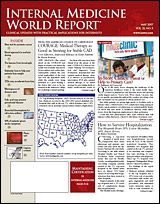Publication
Article
Internal Medicine World Report
First Once-Daily Oral Therapy Promising Option for Relapsing MS
Author(s):
CHICAGO—The first once-daily oral therapy for the treatment of relapsing multiple sclerosis (MS) has shown promising results in a 2-year study. Patients receiving the investigational drug fingolimod (Novartis), a sphingosine-1-phosphate receptor modulator, maintained low disease activity and had a reduced risk for relapse, reported Ludwig Kappos, MD, at the American Neurological Association annual meeting.
Unlike current MS treatments that require frequent injections, “Fingolimod is given conveniently in the form of a once-daily pill,” said Dr Kappos, of the Departments of Neurology and Research, University Hospital, Basel, Switzerland.
The study included 281 patients with relapsing MS who were initially randomized to 1.25 or 5 mg of fingolimod once daily or to placebo. After 6 months of treatment, the median number of gadolinium-enhanced lesions seen on magnetic resonance imaging (MRI) was significantly lower in patients receiving fingolimod than in the placebo group. In addition, the annualized relapse rate was 55% lower in the low-dose fingolimod group and 53% lower in the high-dose group compared with placebo. The study was also published in the New England Journal of Medicine (2006; 355: 1124-1140).
A total of 227 patients were then enrolled in an extension phase, during which the original placebo patients were rerandomized to 1 of the 2 fingolimod doses. The median number of lesions on MRI remained low, and relapse rates continued to decline with the active treatment, Dr Kappos said.
At the end of 2 years, among those who continuously took fingolimod, 87% of the 5-mg group and 81% of the 1.25-mg group were free of lesions on MRI; and 74% and 72%, respectively, had no MS relapses.
Among the original placebo patients, 91% of those switched to high-dose fingolimod and 79% of the low-dose treatment recipients remained free of new lesions; 24% of patients in both groups had no relapses.
“The results are promising and, if confirmed by phase 3 data, fingolimod could contribute significantly to improving the quality of life of patients with relapsing MS,” Dr Kappos said.






